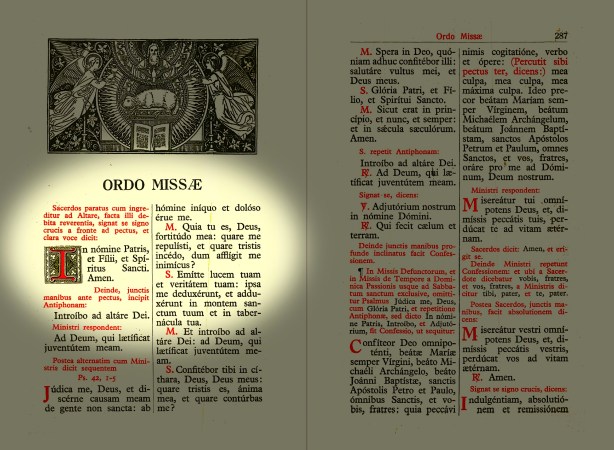 HERE’S AN OLD SAYING: “Sometimes you win and sometimes you learn.” Are you someone who constantly makes mistakes? I am. Do you learn from your mistakes? That’s the key. I constantly make mistakes, but it’s okay because I learn from them. For example, I created an organ accompaniment for VESPERS on the Feast of the Transfiguration. During the process of creating it, I tried tons of new techniques. Some worked; many didn’t. Then, while I was accompanying VESPERS yesterday, the organ broke halfway through! But it’s all fine, because the booklet will be ready for next year—and everything I learned will be helpful next time I make a booklet:
HERE’S AN OLD SAYING: “Sometimes you win and sometimes you learn.” Are you someone who constantly makes mistakes? I am. Do you learn from your mistakes? That’s the key. I constantly make mistakes, but it’s okay because I learn from them. For example, I created an organ accompaniment for VESPERS on the Feast of the Transfiguration. During the process of creating it, I tried tons of new techniques. Some worked; many didn’t. Then, while I was accompanying VESPERS yesterday, the organ broke halfway through! But it’s all fine, because the booklet will be ready for next year—and everything I learned will be helpful next time I make a booklet:
* PDF Download • TRANSFIGURATION BOOKLET (25 pages)
—Organ Accompaniment Booklet • 6 August • VESPERS.
Hymn for the Transfiguration • Moreover, I was able to add a Latin version of “Quicúmque Christum Quǽritis” at the bottom of this website for choirs forbidden to sing in English. I have often declared that the Vespers hymn for the Sacred Heart contains more hyper-metric syllables than any other—but I see that “Quicúmque Christum Quǽritis” is a close second. Indeed, there’s something funky about its hyper-metric syllables, in particular the word “óculos.” Most occur in the same spot, which leads me to believe its “original” melody might have something to do with this. You can see how “Quicúmque” appeared in the edition by Abbat Pothier’s student if you click here. The Gregorian melody is not one of my favorites. I find it hard for congregations to sing well and a little too “dark.”
Historic Release! • Today, we release something quite remarkable. It’s a special edition of the “Missale Romanum” printed in Turin—with North American feasts in a supplement—by the MARIETTI PUBLISHING COMPANY in 1957:
* PDF Download • MISSALE ROMANUM (Turin, 1957)
—Beware! This file is 1.58GB.
![]()
![]()
Liturgical Changes! • I feel bad for the MARIETTI PUBLISHING COMPANY. They went to immense trouble in order to include the Pius XII Holy Week, which was first used in 1956. However, just a few years later the entire book would become obsolete. The amount of liturgical changes made during the 20th century are staggering. Pope Saint Pius X made many liturgical changes. In my humble opinion, the way he restored the ancient TEMPORALE was praiseworthy. After Pius X, you had new prefaces and feasts added. Pope Pius XII then made innumerable changes to the liturgy. The 1960s brought more changes, as did the 1970s. Indeed, the Abbey of Solesmes refused to incorporate the 1961 rubrical changes made by Pope Saint John XIII in their famous LIBER USUALIS. I believe the reason they refused is because it would’ve required enormous effort, and everything was about to change again! It’s almost as if Solesmes Abbey (given charge of all official Vatican plainsong editions beginning in 1913) was saying to the Vatican in 1961:
“Let us know when you get your house in order. Only then will we begin laboriously implementing these incessant ‘improvements’ you are constantly making to our liturgical books.”
![]()
![]()










